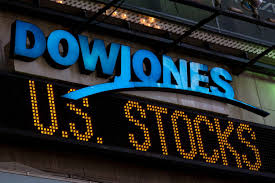H1: Introduction to Dow Jones Stock Futures
- What Are Dow Jones Stock Futures?
- Importance of Futures in the Stock Market
H2: The Dow Jones Industrial Average (DJIA)
- History of the DJIA
- Components of the DJIA
- How the DJIA is Calculated
H2: What Are Stock Futures?
- Definition of Stock Futures
- Difference Between Stocks and Stock Futures
- Why Investors Use Futures Trading
H2: Understanding Dow Jones Stock Futures
- How Dow Jones Futures Work
- Factors Affecting Dow Jones Futures
- Trading Hours for Dow Jones Futures
H2: Key Players in the Dow Jones Futures Market
- Institutional Investors
- Retail Traders
- Hedge Funds
H2: How to Trade Dow Jones Stock Futures
- Steps to Start Trading
- Choosing the Right Brokerage
- Key Strategies for Futures Trading
H2: Benefits of Trading Dow Jones Futures
- Hedging Against Market Fluctuations
- Leverage Opportunities
- High Liquidity
H2: Risks Associated with Dow Jones Futures
- Market Volatility
- Leverage Risks
- Margin Calls
H2: Technical and Fundamental Analysis for Dow Jones Futures
- Key Technical Indicators
- Fundamental Analysis Strategies
- Sentiment Analysis in Futures Trading
H2: Dow Jones Futures vs. S&P 500 Futures
- Key Differences
- Which One Should You Trade?
- Performance Comparison
H2: The Role of Economic Indicators in Dow Jones Futures
- GDP Reports
- Employment Data
- Federal Reserve Policies
H2: How News Impacts Dow Jones Futures
- Geopolitical Events
- Corporate Earnings Reports
- Inflation and Interest Rate Announcements
H2: Trading Strategies for Dow Jones Futures
- Day Trading Strategies
- Swing Trading Strategies
- Long-Term Investment Strategies
H2: Tools and Resources for Futures Traders
- Best Trading Platforms
- Recommended Books and Courses
- Top Financial News Websites
H2: Conclusion
- Summary of Key Points
- Future Outlook for Dow Jones Futures
H2: FAQs
- What time do Dow Jones futures start trading?
- Can beginners trade Dow Jones futures?
- How much money do I need to start trading Dow Jones futures?
- Are Dow Jones futures a good investment?
- What is the best strategy for trading Dow Jones futures?
Introduction to Dow Jones Stock Futures
Dow Jones stock futures play a crucial role in the global financial market. They provide investors with the opportunity to speculate on the future direction of the Dow Jones Industrial Average (DJIA) before the stock market officially opens. But what exactly are they, and how do they work? In this guide, we’ll break down everything you need to know about Dow Jones stock futures.
The Dow Jones Industrial Average (DJIA)
History of the DJIA
The DJIA, one of the most well-known stock market indices, was created in 1896 by Charles Dow. Originally composed of just 12 companies, it has grown to include 30 of the largest publicly traded companies in the U.S.
Components of the DJIA
The index includes industry giants like Apple, Microsoft, and Boeing, representing a broad spectrum of the U.S. economy.
How the DJIA is Calculated
Unlike other indices, the DJIA is price-weighted, meaning stocks with higher prices have a greater impact on the index’s movements.
Related Post >>> everything you need to know about making money with cryptocurrency
2. Drake University: History, Campus Overview
What Are Stock Futures?
Stock futures are contracts that allow traders to buy or sell an index at a predetermined price on a future date. Unlike regular stock trading, futures provide leverage and can be used for hedging or speculation.
Difference Between Stocks and Stock Futures
While stocks represent ownership in a company, stock futures are contracts based on an index’s future value.
Why Investors Use Futures Trading
Investors use futures to hedge against market downturns or speculate on price movements to make a profit.
Understanding Dow Jones Stock Futures
How Dow Jones Futures Work
Dow Jones futures track the DJIA’s expected performance based on pre-market and after-hours trading. If futures are up, it indicates bullish market sentiment.
Factors Affecting Dow Jones Futures
- Economic data (e.g., employment reports, GDP growth)
- Global market trends
- Geopolitical events
Trading Hours for Dow Jones Futures
Dow Jones futures trade almost 24 hours a day, offering traders flexibility.
How to Trade Dow Jones Stock Futures
- Open a brokerage account.
- Research market trends and indicators.
- Choose a trading strategy.
- Monitor economic news and earnings reports.
Benefits and Risks of Trading Dow Jones Futures
Benefits:
- Provides market insight before the stock market opens.
- Offers leverage, allowing for greater profit potential.
- High liquidity ensures ease of entry and exit.
Risks:
- Leverage can lead to significant losses.
- Market volatility may result in unexpected price swings.
- Margin calls require additional funds to maintain positions.
Conclusion
Dow Jones stock futures are a powerful tool for traders looking to capitalize on market movements. While they offer numerous benefits, including leverage and liquidity, they also come with significant risks. Understanding how they work and developing solid trading strategies can help investors navigate this dynamic market effectively.
- Trending Topic >>> Remote Nursing Jobs in Canada: Opportunities, Roles, and Insights
- UK VISA SPONSORSHIP JOBS AND HOW TO APPLY
FAQs
- What time do Dow Jones futures start trading?
Dow Jones futures begin trading at 6:00 PM Eastern Time (ET) on Sunday and continue through Friday. - Can beginners trade Dow Jones futures?
Yes, but it’s essential to learn about leverage, margin requirements, and risk management first. - How much money do I need to start trading Dow Jones futures?
The minimum varies by broker, but typically, traders need at least $5,000 to $10,000. - Are Dow Jones futures a good investment?
They can be profitable but also come with high risks. It depends on your trading experience and risk tolerance. - What is the best strategy for trading Dow Jones futures?
Strategies like trend following, breakout trading, and news-based trading are popular among traders
The Dow Jones Industrial Average (DJIA) futures index is one of the most widely recognized and actively traded financial instruments globally. It offers traders and investors a way to speculate on the future value of the DJIA, a stock market index comprising 30 large, publicly traded U.S. companies. This article delves into the fundamentals of DJIA futures, their benefits, risks, trading strategies, and their role in the broader financial markets.
What Are DJIA Futures?
DJIA futures are standardized contracts that allow market participants to buy or sell the Dow Jones Industrial Average at a predetermined price on a specific future date. These contracts are traded on futures exchanges like the Chicago Mercantile Exchange (CME) and are settled either through cash or physical delivery.
Key Features of DJIA Futures
-
Contract Size: Each DJIA futures contract represents $10 times the current value of the DJIA index. For instance, if the index is at 30,000 points, the notional value of one contract is $300,000.
-
Tick Size: The minimum price movement, or tick size, is 1 point, equivalent to $10 per contract.
-
Expiration Dates: Contracts typically expire on the third Friday of their expiration month.
-
Trading Hours: DJIA futures trade nearly 24/5 on CME Globex, with brief daily breaks for maintenance.
A Brief History of the DJIA
The Dow Jones Industrial Average was created by Charles Dow in 1896 as a barometer for U.S. economic health. Initially comprising 12 industrial stocks, it expanded to 30 stocks in 1928 and has since been a benchmark for broader market performance. The transition of the DJIA into futures trading marked a significant milestone, offering investors an efficient tool for hedging and speculation.
Benefits of Trading DJIA Futures
1. Diversification
DJIA futures provide exposure to a broad range of industries represented by the 30 companies in the index. This diversification helps spread risk across various sectors.
2. Leverage
Futures trading allows participants to control large positions with relatively small capital investments. This leverage can amplify gains but also increases potential losses.
3. Hedging Opportunities
Investors use DJIA futures to hedge against market volatility or protect their portfolios from adverse price movements. For instance, an investor holding a portfolio of U.S. equities might short DJIA futures to offset potential losses during market downturns.
4. Liquidity
The high liquidity of DJIA futures ensures ease of entry and exit for traders, even during periods of heightened market volatility.
5. Transparency
Real-time price quotes and order books provide a transparent view of market dynamics, enabling informed decision-making.
Risks Associated with DJIA Futures
While DJIA futures offer numerous advantages, they also carry inherent risks:
1. Leverage Risk
The same leverage that magnifies gains can also lead to substantial losses if trades move against expectations4.
2. Market Volatility
DJIA futures are sensitive to macroeconomic data, Federal Reserve policies, and geopolitical events. Sudden market swings can result in significant losses for unprepared traders.
3. Complexity
Understanding the nuances of futures trading requires knowledge of margin requirements, contract specifications, and market dynamics. Novice traders may face challenges navigating these complexities.
Trading Strategies for DJIA Futures
1. Day Trading
Day traders capitalize on short-term price movements in DJIA futures using technical analysis tools like moving averages and Bollinger Bands. They often focus on high-volatility periods such as market openings and closings.
2. Swing Trading
Swing traders hold positions for several days or weeks to profit from medium-term trends in the index.
3. Hedging
Institutional investors frequently use DJIA futures to hedge against adverse movements in their equity portfolios.
4. Arbitrage
Arbitrage strategies involve exploiting price discrepancies between DJIA futures and other correlated instruments.
Factors Influencing DJIA Futures Prices
Several factors impact the pricing of DJIA futures:
-
Macroeconomic Indicators: Data such as GDP growth, unemployment rates, and inflation influence investor sentiment.
-
Federal Reserve Policies: Interest rate decisions and monetary policy announcements significantly affect market dynamics.
-
Earnings Reports: Quarterly earnings from companies within the index can lead to fluctuations in DJIA futures prices.
-
Geopolitical Events: Political instability or global crises often result in heightened volatility.
How Institutions Use DJIA Futures
Institutional investors such as hedge funds and mutual funds utilize DJIA futures for efficient exposure to U.S. equity markets:
-
They can quickly adjust portfolio allocations without buying or selling individual stocks.
-
The high liquidity ensures scalability for large-volume trades without significantly impacting prices.
Day Trading Tips for DJIA Futures
For those engaging in day trading:
-
Monitor macroeconomic events closely.
-
Use stop-loss orders to manage risk effectively.
-
Avoid overleveraging positions.
-
Stay updated with real-time news that could impact markets.
Conclusion
DJIA futures are a versatile financial instrument offering opportunities for speculation, hedging, and portfolio diversification. While they provide significant benefits such as leverage and liquidity, they also come with risks that require careful management. By understanding their mechanics and employing disciplined trading strategies, both retail and institutional investors can harness the potential of this powerful tool in financial markets.
Be the first to get new scholarships, job updates, inspiring Fazza poems, lifestyle stories, and more — straight to your inbox.


